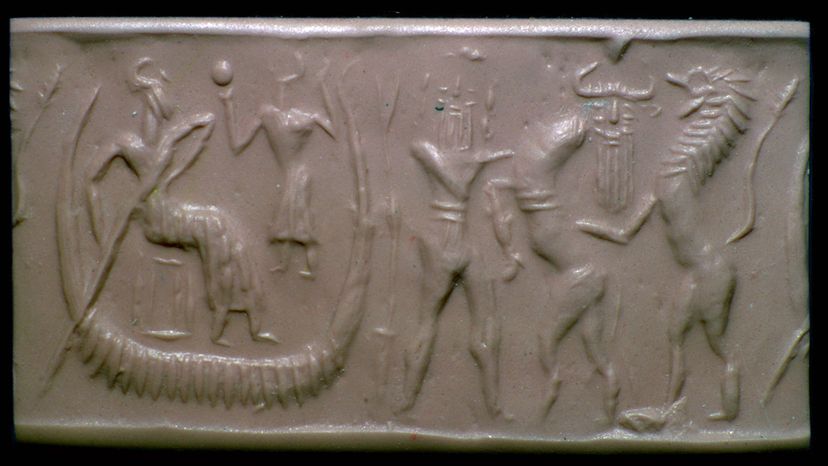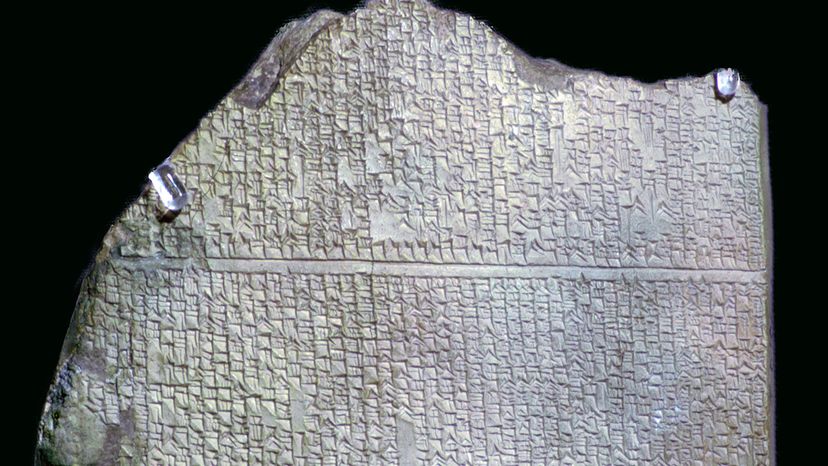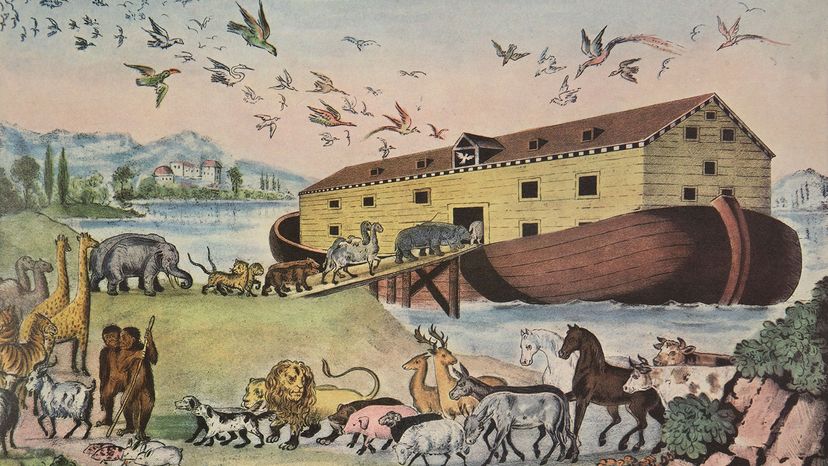
In November 1872, a self-taught historian named George Smith toiled away in the archives of the British Museum sorting through fragments of clay tablets recovered from ancient Mesopotamian archeological sites in modern-day Iraq. The tablets were written in cuneiform — a language that had only recently been recovered and translated after 1,000 years of obscurity — and most of the fragments contained humdrum accounting records or opaque prophecies from palace priests.
But then Smith found something remarkable. As he translated the cuneiform word by word, a familiar story unfolded. There was a god punishing humanity with a catastrophic flood, one man who was chosen to survive using a specially constructed boat filled with animals and seeds, and after the flood, birds being released to find dry land.
Advertisem*nt
This wasn't the story of Noah and the ark, though, and this wasn't the book of Genesis in the Hebrew Bible (known to Christians as the Old Testament). What Smith had discovered was only one chapter in a sprawling Mesopotamian tale now known as the Epic of Gilgamesh, first written in 1,800 B.C.E., around 1,000 years before the Hebrew Bible.
"The Epic of Gilgamesh is the oldest tragic epic for which we have evidence," says Louise Pryke, an honorary research associate at the University of Sydney and author of "Gilgamesh," a deep analysis of the text and its influences on later works, from the Bible to Homer's "Odyssey." "It's something that's come to represent ancient Mesopotamia in modern culture."
When Smith first made the connection between the two flood stories in Gilgamesh and Genesis, legend says that he became so excited that he danced around the room removing his clothes. Smith's discovery shook the foundations of biblical scholarship by proposing that some, if not all, of the Hebrew Bible was borrowed from neighboring civilizations.
Pryke says that while the flood narrative in Genesis is clearly inspired by the tale in Gilgamesh, the similarities and differences in the ancient accounts can teach us important things about what these two cultures valued and their cosmic worldviews.
"These are cultures that are in dialogue with one another and their stories are in dialogue with one another," says Pryke.
Advertisem*nt
Contents
- What's the Epic of Gilgamesh All About?
- Similarities and Differences Between the Two Flood Stories
- Morality Tale vs. Wisdom Literature
- Did the Bible 'Steal' the Flood Story from Gilgamesh?
- Other Similarities Between Gilgamesh and the Bible
- Do Multiple Accounts Point to a Real Flood?
What's the Epic of Gilgamesh All About?
The Epic of Gilgamesh chronicles the adventures of the semi-divine King Gilgamesh (circa 2700 B.C.E.) as he leaves his home city of Uruk to battle mythical beasts and obtain the secret to eternal life. Not only is this text one of the earliest examples of a hero's quest, it's the first to feature a "bromance" in the partnership of Gilgamesh and his best friend Enkidu, who sadly dies midway through the story.
The flood narrative forms the heart of Tablet XI, when Gilgamesh seeks out the only survivors of the great deluge, Utanapishtim and his wife, whom the gods granted with immortality. As Utanapishtim tells it, the chief god, Enlil, was tired of humans keeping him awake with all their noise, so he decided to destroy them (or at least "diminish" them) with a terrible flood.
Enlil forces the gods to make a pact not to tell any humans about the impending inundation, but Ea, the god of wisdom, figures out a clever workaround. He loudly tells a reed wall about Enlil's plan, knowing that Utanapishtim is behind the wall and will overhear everything. Utanapishtim follows Ea's instructions to build a boat of specific dimensions, load it with riches, seeds and animals of every kind, and seal it against the coming storm.

When the torrential rains halt after six days and seven nights, Utanapishtim sends out three birds in succession — a dove, a sparrow and a raven — to find dry land. When the raven doesn't return, Utanapishtim and his family offer sacrifices to the gods, who are near starvation without any people to feed them.
While the oldest partial fragments of Gilgamesh date back to nearly 2000 B.C.E., Pryke says that the best-known Babylonian version was likely penned by Sin-leqi-unninni, an exorcist priest who lived around 1100 B.C.E. The earliest parts of the Hebrew Bible, including much of Genesis, were written around 950 B.C.E.
Advertisem*nt
Similarities and Differences Between the Two Flood Stories
Comparing the flood narrative in Gilgamesh to the biblical flood in Genesis "is an area of scholarship that has attracted more attention than pretty much anything else in the history of Assyriology," says Pryke. What's even more incredible about Smith's discovery is that more than a century later, the flood is still the strongest connection between the two texts.
Here are the elements of the flood story that Gilgamesh and the Hebrew Bible share, says Pryke:
Advertisem*nt
- A divine commitment to destroy most of humanity
- The focus on a named flood survivor
- Building an ark or boat that is described in detail in the narrative
- Animals being put on board to preserve their species
- The flood, obviously
- Sending out birds to see if the flood waters have receded
- Post-diluvial sacrifices to repair the relationship between humanity and the divine
While the similarities have drawn most of the scholarly attention, Pryke says there's as much to learn from where the accounts differ and what that tells us about the cultures in which each tale was told. Some of those differences include:
- The different number of gods involved, which reflects the polytheism of Mesopotamia and the monotheism of the Hebrews.
- The depiction of the storm. In Genesis, the storm is hardly mentioned, while the depiction in Gilgamesh is vivid and violent.
- The subplot of Ea, the god of wisdom, plotting to save Utanapishtim, his favorite in Gilgamesh, is completely missing from Genesis.
- The warning to the mortal of the flood. In Genesis, God warns Noah explicitly of the coming destruction, but in Gilgamesh, Ea tells Utanapishtim to couch his prophecies in riddles.
Advertisem*nt
Morality Tale vs. Wisdom Literature
Perhaps the biggest difference between the flood narratives in Gilgamesh and Genesis is the moral of the two stories. In both traditions, a divine power decides to kill off humanity, but in each tale, mankind survives for different reasons. Noah is preserved because he is the most morally clean and obedient. Utanapishtim, on the other hand, is saved quite literally by wisdom, by obtaining divine knowledge.
Pryke says that while the Hebrew version of the flood story hinges on morality — the destruction of the wicked and the saving of the righteous — the authors of Genesis display a "wary engagement with wisdom" elsewhere. Think of the Tree of Knowledge in the Garden of Eden; Adam and Eve are punished for eating its fruit and trying to obtain divine wisdom (and become like God).
Advertisem*nt
In Gilgamesh, the flood story is meant to be instructive for young King Gilgamesh in order to learn his place in the cosmic order.
"As king, Gilgamesh has to mediate between humanity and the gods," says Pryke. "And if that mediation breaks down, things can become quite apocalyptic."
Advertisem*nt
Did the Bible 'Steal' the Flood Story from Gilgamesh?
All signs point to yes, that the authors of Genesis were clearly aware of the divine deluge described in the earlier Epic of Gilgamesh.
"We actually have the smoking gun," says Pryke. "Archeologists have found bits of the Epic of Gilgamesh all over [Ancient Israel]. It looks like Gilgamesh was something that was in broad circulation at the time."
Advertisem*nt
Since both the Bible and Gilgamesh were passed along as oral traditions long before they were written down, it's possible that the Mesopotamian flood narrative first entered Hebrew culture as a type of "contest literature" similar to 1001 Arabian Nights.

"People traveled somewhere and they'd compete to tell the most remarkable stories that they knew from their culture," says Pryke, "and then you got this cultural discourse that was happening."
Advertisem*nt
Other Similarities Between Gilgamesh and the Bible
While the flood story is the greatest example of Mesopotamian influence on Hebrew culture, there are some other crossovers.
Found among the ancient Dead Sea Scrolls, for example, is the apocryphal book of 1 Enoch that includes the "Book of Giants," an account of the supersized beings who walked the Earth before the flood. One of those giants, not coincidentally, is named Gilgamesh, and another shares the name of a monster that Gilgamesh destroyed in his epic tale.
Advertisem*nt
There's also a remarkable similarity between some sagely advice first given in Gilgamesh and later in the book of Ecclesiastes in the Hebrew Bible. Here's the text from Gilgamesh:
You, Gilgamesh, let your belly be full, Keep enjoying yourself, day and night! Every day, make merry, dance and play day and night! Let your clothes be clean! Let your head be washed, may you be bathed in water. Gaze on the little one who holds your hand, Let a wife enjoy your repeated embrace, Such is the destiny [of mortal men].
And here it is in Ecclesiastes 9:7-9:
7. Go, eat your bread with enjoyment, and drink your wine with a merry heart; for God has long ago approved what you do. 8. Let your garments always be white; do not let oil be lacking on your head. 9. Enjoy life with the wife whom you love, all the days of your vain life that are given you under the sun, because that is your portion in life and in your toil at which you toil under the sun.
However, the similarity in these texts may simply mean that these were common sayings of the time. "It would be precipitous to surmise that the similarities between these two passages necessarily result from cultural contact or any direct contact between the texts. Good advice seems to have a certain timeless quality, particularly when it is expressed in broad terms that may be applicable to a range of situations and periods," Pyrke wrote on the website The Bible and Interpretation.
Advertisem*nt
Do Multiple Accounts Point to a Real Flood?
Irving Finkel is a modern-day heir to George Smith. Finkel also works at the British Museum and in 1985 discovered yet another ancient flood narrative written in cuneiform on a fragment of tablet recovered in Iraq. This account, believed to be even older than Gilgamesh, features a Noah-like character named Atrahasis whom the gods command to build a circular boat in preparation for a devastating deluge.
So, the natural question is, does the existence of multiple ancient flood narratives amount to proof of a real flood that came close to wiping out all of humanity? Finkel told the London Telegraph that it's very possible there was a massive flood that struck the Tigris and Euphrates Valley between 5,000 and 7,000 years ago and persisted in the collective Mesopotamian memory. Pryke agrees that "it's a reasonable thing to assume that there was [a flood]."
Advertisem*nt
Now That's Interesting
Pryke says that there's a passage in the Epic of Gilgamesh that may have been inspired by another major environmental disaster. "Toward the middle of the narrative, he cuts down the forest of the cedars in Lebanon and destroys it. This seems to be a reference to the historical deforestation of that area that happened 1,000 years before Gilgamesh was written down."